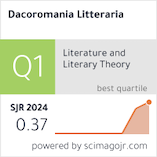VALESKA BOPP-FILIMONOV
EXTRAORDINARY BODIES IN LIVIU REBREANU'S ION. A READING THROUGH THE LENS OF DISABILITY STUDIES
DOI: 10.33993/drl.2024.11.8.27
Affiliation: Institute for Romance Studies, Friedrich Schiller University Jena.
Contact details: Institute for Romance Studies, Friedrich Schiller University Jena, Ernst-Abbe-Platz 8, 07743 Jena, Germany.
Email: valeska.bopp-filimonov@uni-jena.de
EXTRAORDINARY BODIES IN LIVIU REBREANUʼS ION. A READING THROUGH THE LENS OF DISABILITY STUDIES
(Abstract)
This article aims to develop a Disability Studies inspired reading of the Romanian canonical novel Ion by Liviu Rebreanu. Consequently, the paper focuses on the marginal figures endowed with physical impairments. On the one hand, the novel impressively depicts the ethnic and gender hierarchy in the village society of the time. The hierarchy is closely linked with degrees of disability: the physically impaired and mentally weak have at least one further characteristic of “disadvantage”. This could be a “race” or gender considered inferior and directly associated with a social disadvantage. On the other hand, the analysis reveals how the protagonist’s particularly potent body functions as a foil for contrast and comparison. Even though Ion is the protagonist, he dies in the end. Does the able-bodied then also have no future? A visionary answer lies in the symbolic link between the charactersʼ bodily condition and the Romanian state of nationhood. At the time when the novel is set, the very beginning of the 20th century, the modern Romanian nation, including all Romanians, had not yet been fulfilled. But Ion leaves behind an illegitimate child to be birthed by the apparently most able-bodied woman of the village Pripas. Therefore, he leaves a legacy – and with it, the chance of a prosperous future. This shows how the eugenic debates of the time were also internalized by Rebreanu, as biological strength and the will to survive are positively united and linked to the idea of the (Romanian) nation, while all others are given no chance.
Keywords: : Liviu Rebreanu, Ion, disability, intersectionality, nation.
CORPURI EXTRAORDINARE ÎN ION DE LIVIU REBREANU. O LECTURĂ DIN PERSPECTIVA STUDIILOR DIZABILITĂȚII
(Rezumat)
Articolul propune o reinterpretarea a romanului canonic Ion de Liviu Rebreanu din perspectiva studiilor umaniste ale dizabilității. În consecință, cercetarea se focalizează pe figurile marginale ale romanului, a căror funcționalitate este afectată din cauza unor deficiențe fizice. Pe de o parte, ierarhia socială, etnică și, de asemenea, de gen a societății rurale din acea vreme este descrisă impresionant – și strâns legată de gradele de handicap: persoanele cu deficiențe fizice și mintale au cel puțin o altă caracteristică „debilitantă”, fie că este vorba de o „rasă” sau de un gen care este considerat inferior. Pe de altă parte, articolul dezvăluie cât de important este corpul deosebit de puternic al protagonistului Ion ca element de contrast și de comparație. Chiar dacă este eroul romanului, el moare în cele din urmă. Așadar, nu are viitor nici cel „capabil”? Un răspuns este oferit de legătura simbolică a condiției corporale a personajelor cu starea națiunii române. În momentul în care se petrece acțiunea romanului, chiar la începutul secolului al XX-lea, națiunea română modernă, care îi include pe toți românii, nu era încă împlinită. Dar, lăsând în urmă un copil nelegitim care să fie născut de femeia aparent cea mai atrăgătoare din satul Pripas, Ion lasă o moștenire – și, odată cu ea, șansa unui viitor prosper. Această situație arată cum dezbaterile eugenice ale vremii au fost interiorizate și de Rebreanu, forța biologică și voința de supraviețuire fiind unificate și corelate cu ideea de națiune (română), în timp ce tuturor celorlalți nu li se dă nicio șansă.
Cuvinte-cheie: Liviu Rebreanu, Ion, dizabilitate, intersecționalitate, națiune.


